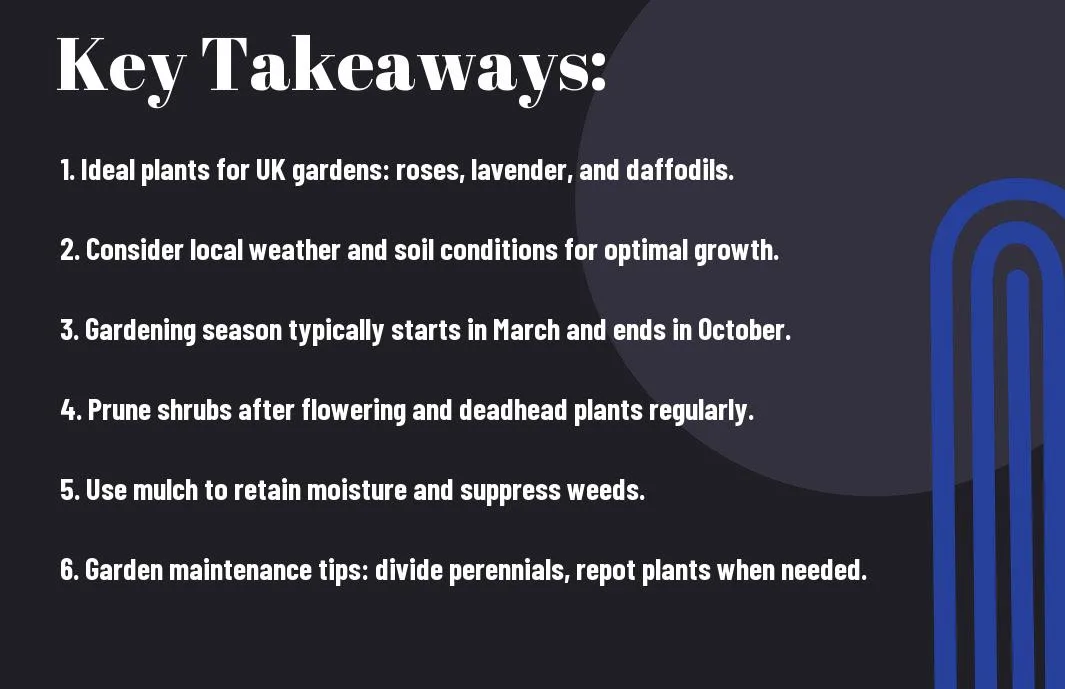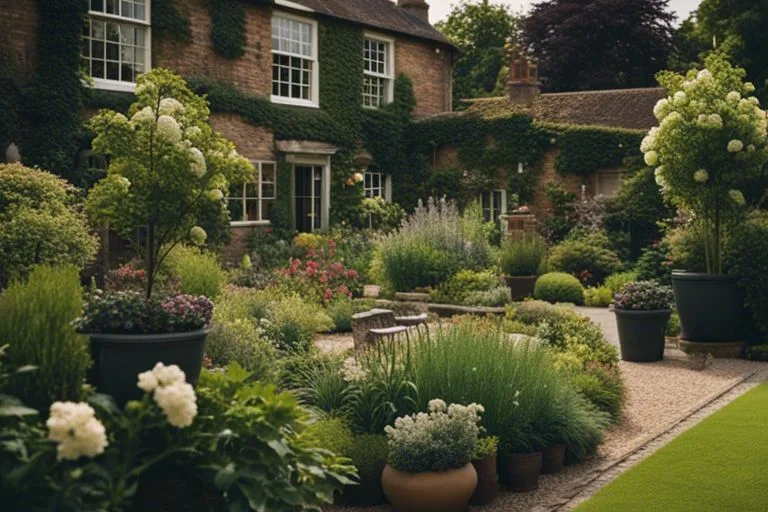There’s a bountiful world of gardening waiting to be explored in the UK, and what better way to navigate it than with expert tips and advice? In this informative review, we’ll dig deep into the best practices, tricks of the trade, and top recommendations for gardening enthusiasts looking to cultivate their green thumb in the British soil. Let’s uncover the secrets to successful gardening in the UK, inspired by the rich horticultural heritage of this lush and vibrant land. Join us on this journey of discovery and growth as we research into the world of UK gardening with a discerning eye and a passion for all things green.
Choosing the Right Plants for UK Climate
For expert guidance on selecting the best plants for your UK garden, check out this helpful Gardening Tips and Tricks video series. When considering choosing plants for your UK garden, it’s necessary to consider the climate and conditions specific to the region. Understanding the difference between native plants and exotics can help you create a sustainable and thriving garden.
Native Plants vs. Exotics
Choosing native plants for your UK garden can offer several advantages. Native plants are well-adapted to the local climate, soil, and wildlife, making them low-maintenance and environmentally friendly choices. They also provide necessary habitats and food sources for native insects and birds, supporting biodiversity in your garden. On the other hand, exotic plants can add diversity and unique aesthetics to your garden but may require more maintenance and resources to thrive.
Hardy Perennials for UK Gardens
On the quest for the perfect plants for your UK garden, hardy perennials are a reliable choice. These plants come back year after year, enduring the UK’s unpredictable weather conditions with resilience. From vibrant asters to delicate primroses, there is a wide range of hardy perennials to choose from, offering color and interest throughout the seasons. With proper care and attention, hardy perennials can form the backbone of a beautiful and sustainable garden in the UK.
Soil Secrets for UK Gardeners
Some ‘Hedgelands’ Review: Essential Ecosystems
Testing Your Soil Type
On the journey to becoming a successful gardener in the UK, understanding your soil type is crucial. Different regions in the UK have varying soil compositions, from clay and loam to sand and chalk. To ensure your plants thrive, it’s crucial to test your soil type. You can easily do this by purchasing a soil testing kit from your local garden center or contacting a professional soil testing service. Once you know your soil type, you can choose the right plants and adjust your gardening practices accordingly for optimal growth.
Improving Soil Structure and Fertility
One
Soil structure and fertility play a vital role in the health of your garden. To improve both aspects, consider adding organic matter such as compost, well-rotted manure, or leaf mold to your soil. This will help enhance its structure, making it more conducive to plant growth. Additionally, organic matter boosts soil fertility by providing crucial nutrients for plants. Regularly incorporating organic matter into your soil can result in healthier plants, improved drainage, and better water retention, all contributing to a flourishing garden.
Soil structure and fertility are fundamental elements that can make or break your gardening efforts. By understanding your soil type, testing it regularly, and enriching it with organic matter, you can create a thriving garden that rewards you with beautiful blooms and bountiful harvests.
Mastering UK Weather Conditions
Not surprisingly, one of the biggest challenges that gardeners in the UK face is the unpredictable weather. From torrential rain to scorching heatwaves, being prepared for all eventualities is key to maintaining a thriving garden.
Dealing with Rain and Flooding
Rain can be both a blessing and a curse for gardeners in the UK. While plants need water to thrive, excessive rainfall can lead to waterlogged soil and root rot. To prevent waterlogging, make sure your garden has proper drainage by incorporating raised beds or adding organic matter to improve soil structure. Additionally, consider planting water-loving plants that can withstand periods of heavy rain.
Coping with Drought and Heatwaves
With the UK experiencing more frequent heatwaves and drought conditions, it’s important to plan ahead to protect your garden during extended periods of hot, dry weather. Mulching your soil can help retain moisture and reduce the need for frequent watering. Choosing drought-resistant plants like lavender, sedum, and verbena can also help your garden withstand the heat and lack of water.
With temperatures on the rise, investing in a water butt to collect rainwater can provide a sustainable water source for your garden during times of drought. Remember to water your plants deeply but less frequently to encourage strong root growth and resilience to drought conditions.
Essential Gardening Tools for UK Gardeners
After getting your hands dirty in the UK soil, it’s time to equip yourself with the important tools for a successful gardening experience. Investing in quality gardening tools will not only make your tasks smoother but also ensure a thriving garden. Let’s probe the must-have hand tools every UK gardener should own.
Must-Have Hand Tools
Gardening in the UK often requires precise and delicate work, making hand tools important for every gardener. Start with a sturdy garden fork and trowel, perfect for digging, turning soil, and planting. A good-quality pair of secateurs is crucial for pruning shrubs and flowers, while a hand weeder will help you tackle those pesky weeds efficiently. Don’t forget a durable pair of gardening gloves to protect your hands while working in the garden.
Investing in Power Tools and Machinery
An efficient way to level up your gardening game in the UK is by investing in power tools and machinery. From electric lawn mowers to hedge trimmers, these tools can help you maintain your garden with ease, especially during the UK’s unpredictable weather. Consider getting a cordless strimmer for reaching tricky spots and keeping the edges of your lawn neatly trimmed. A garden vacuum or blower can also be handy for quickly clearing leaves and debris, especially during the autumn months.
Tools like a pressure washer can help clean your garden paths and patio efficiently, while a garden shredder is perfect for recycling garden waste into compost. These power tools not only save you time and effort but also contribute to a well-maintained and visually appealing garden in the UK.
Designing Your UK Garden
Creating a Functional Layout
Creating a functional layout for your UK garden is imperative to make the most of the space you have. Start by dividing your garden into different zones, such as a dining area, a play area for children, and a relaxing spot for reading or enjoying the view. Pathways should be well-planned to connect these areas seamlessly, ensuring easy access and flow throughout the garden. Consider the natural light patterns in your garden to place sun-loving plants in sunny spots and shade-loving plants in more sheltered areas.
Incorporating Ornamental Features
To add character and charm to your UK garden, incorporating ornamental features is key. Think about including elements such as trellises, archways, or pergolas for vertical interest and to support climbing plants like roses or clematis. Water features like fountains or birdbaths can attract wildlife and create a soothing atmosphere. Don’t forget about adding containers with seasonal plants or sculptures to add personality and style to your outdoor space.
Incorporating ornamental features not only enhances the visual appeal of your garden but also creates focal points that draw the eye and add interest. Consider adding a statement piece like a unique sculpture, a striking plant arrangement, or a carefully placed bench to create a sense of discovery and delight as you explore the different areas of your garden.
Common UK Pests and Diseases
Keep an eye out for common pests and diseases that can affect your garden in the UK. To research deeper into this topic, you might enjoy listening to Gardening with the RHS on Apple Podcasts, where experts share valuable insights and tips on how to deal with these challenges effectively.
Identifying and Controlling Pests
One of the most common pests you may encounter in your UK garden is the aphid. These tiny insects can quickly multiply and damage your plants. To control aphids, consider using natural predators like ladybugs or creating a homemade insecticidal soap. Regularly inspecting your plants can help you catch aphids early before they cause significant harm.
Preventing and Treating Diseases
Diseases such as powdery mildew and tomato blight are prevalent in the UK due to its damp climate. To prevent these diseases, practice good garden hygiene by removing any infected plant debris promptly. Consider using disease-resistant varieties and providing adequate air circulation around plants to reduce humidity levels, which can contribute to disease development.
Diseases like powdery mildew can be treated with fungicides, but prevention is key to maintaining a healthy garden. Additionally, rotating your crops each season can help prevent the buildup of soil-borne diseases, ensuring the long-term health of your plants.
Seasonal Gardening Tips for UK Gardeners
Now, let’s explore into some seasonal gardening tips specifically tailored for gardeners in the UK. Each season brings its own set of tasks and challenges, but with the right approach, you can keep your garden thriving throughout the year.
Spring and Summer Care
Summer is the time when your garden is in full bloom, and it requires consistent care to maintain its beauty. In the UK, summer can bring both sunshine and showers, so it’s vital to keep an eye on watering needs. Regular deadheading of flowers and pruning of shrubs can help promote new growth and keep your garden looking fresh. Remember to also feed your plants with a suitable fertilizer to give them the nutrients they need to flourish.
Thou, don’t forget to keep an eye out for pests and diseases that may thrive in the warm, humid weather. Early detection and treatment are crucial to prevent any major infestations that could harm your plants.
Autumn and Winter Maintenance
Spring is the perfect time to prepare your garden for the colder months ahead. Plus, it’s vital to clean up any fallen leaves and debris, as they can harbor pests and diseases that may harm your plants. Take this time to prune dormant trees and shrubs, as well as protect more delicate plants with mulch or fleece to insulate them from the cold. Don’t forget to continue feeding the birds that visit your garden throughout the winter months, as they can help with pest control.
By following these seasonal gardening tips, you can ensure your garden remains healthy and vibrant all year round, bringing you joy and relaxation in every season.
Conclusion
Considering all points discussed in this review, it is evident that gardening in the UK can be a rewarding and enjoyable experience with the right guidance and expertise. By submerging into the tips and advice provided, both novice and experienced gardeners can enhance their skills and create thriving green spaces.
Just like Monty Don emphasizes in his work, connecting with nature through gardening is a fulfilling journey that can bring joy and tranquility to our lives. Whether you’re looking to improve your garden’s aesthetics, grow your own produce, or simply immerse yourself in the beauty of nature, this review serves as a valuable resource for anyone seeking to cultivate a beautiful garden in the UK.




